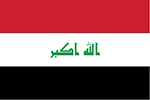
Population
41M+
CHRISTIAN PERSECUTION STATUS
extreme
Persecution
CHRISTIAN POPULATION
<1%
Status of
the church
Iraq is 99% Muslim, and security for Christians has been deteriorating since 2003. Although all religious groups have faced some form of discrimination or unrest in modern Iraq, the rapid emigration rate of Iraqi Christians, an estimated 3,000 per year (International Christian Concern), indicates that the Christian minority has come under much persecution in recent years.
ISIS targets anyone who does not adhere to its extremist Islamist ideology, and there have been numerous incidents of violent attacks, kidnappings, and murders. In October 2010, at least 58 Christians died, and many were injured in a bomb attack on a church in Baghdad. ISIS has retreated from 95% of the land it once occupied, but some areas remain under its control.
In the city of Qaraqosh, where ISIS was driven out in 2016, families have slowly been returning to rebuild their city. But it has taken years for refugees to come back. Today, only around half of the once 55,000-strong population has returned. Amid the ruins, hope is alive. Essam Nagy says in the SAT-7 documentary Sequel of Hope, “The place is packed with people, who are eager to be part of the body of Christ … The whole scene declares the victory of righteousness over darkness and hatred.”
Location
Prayer points